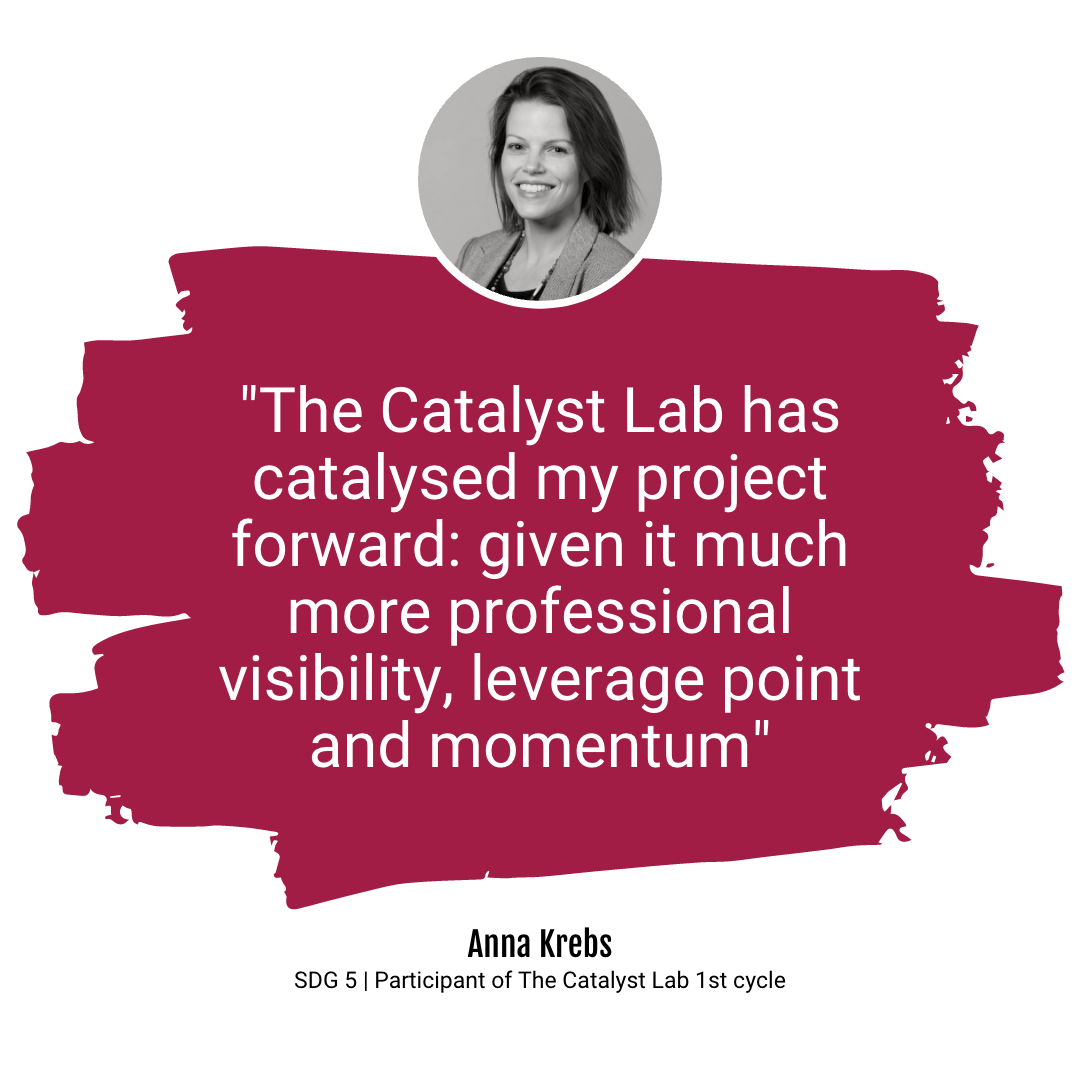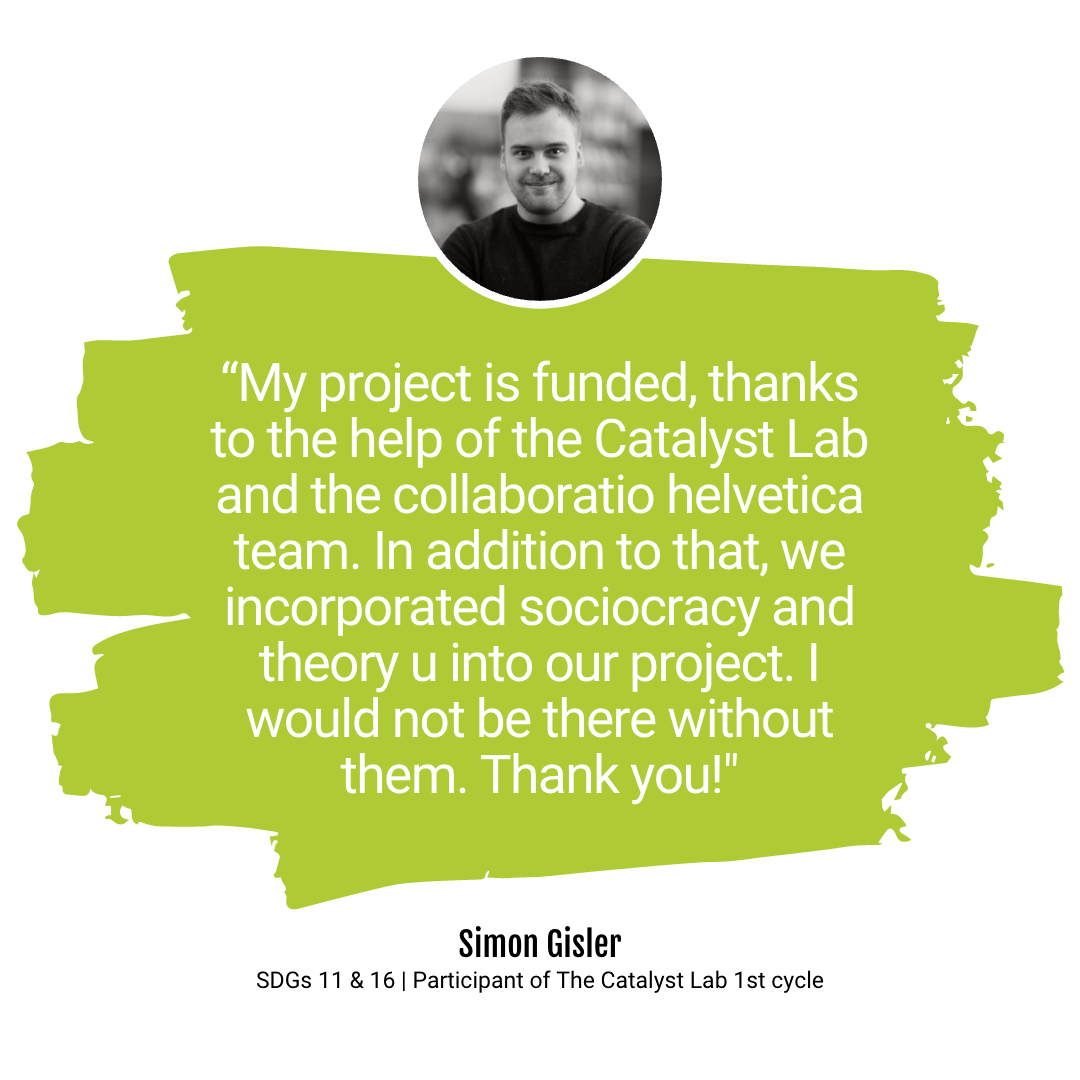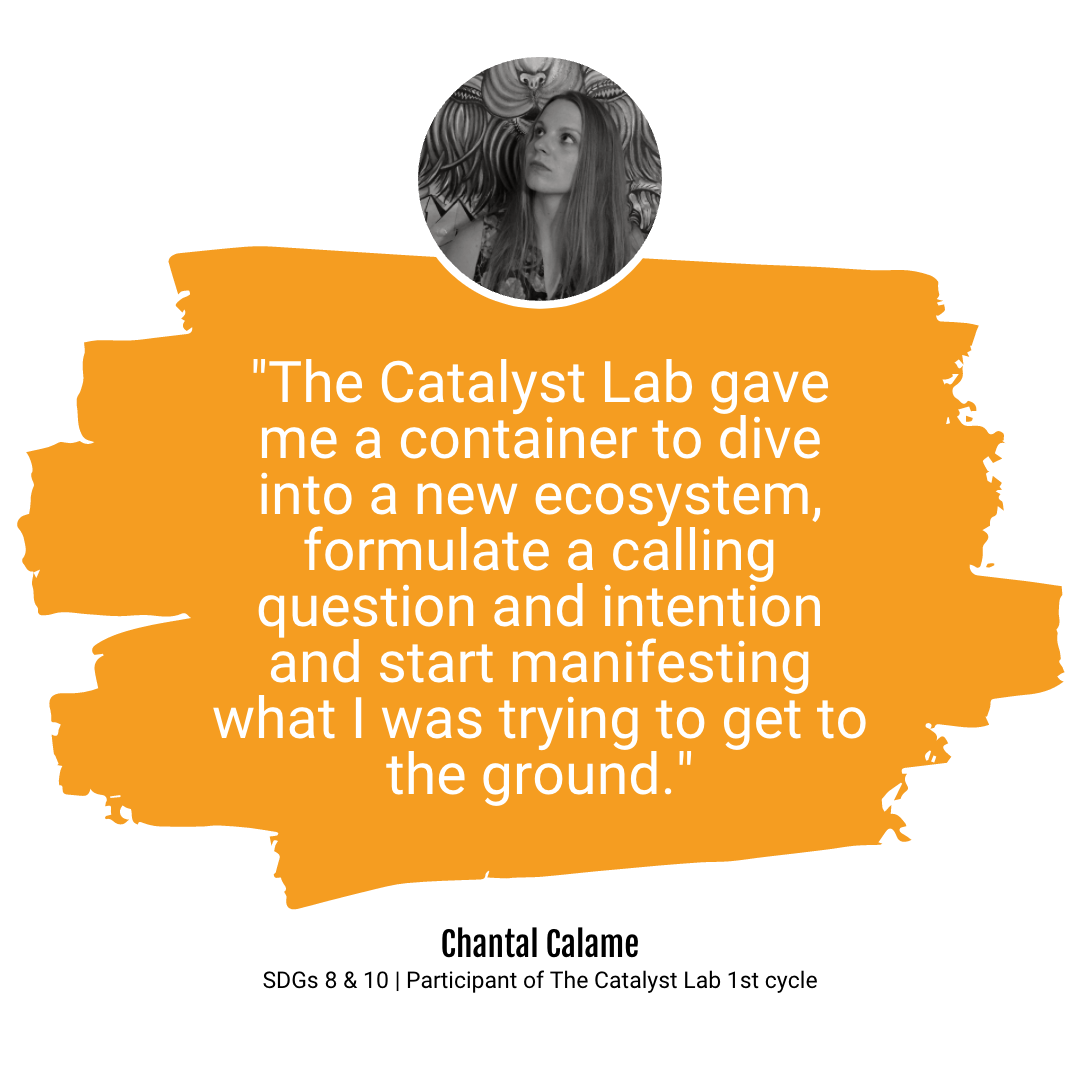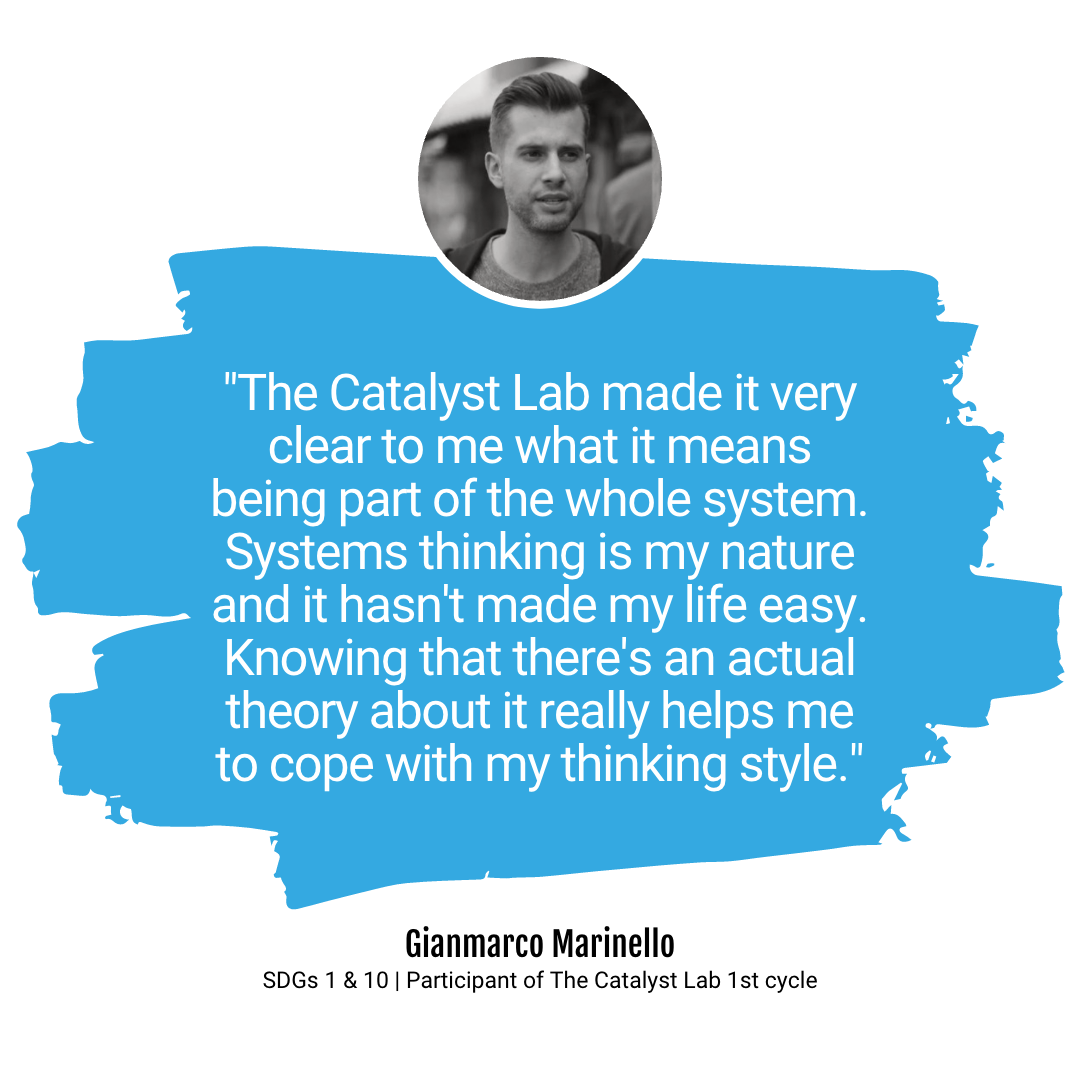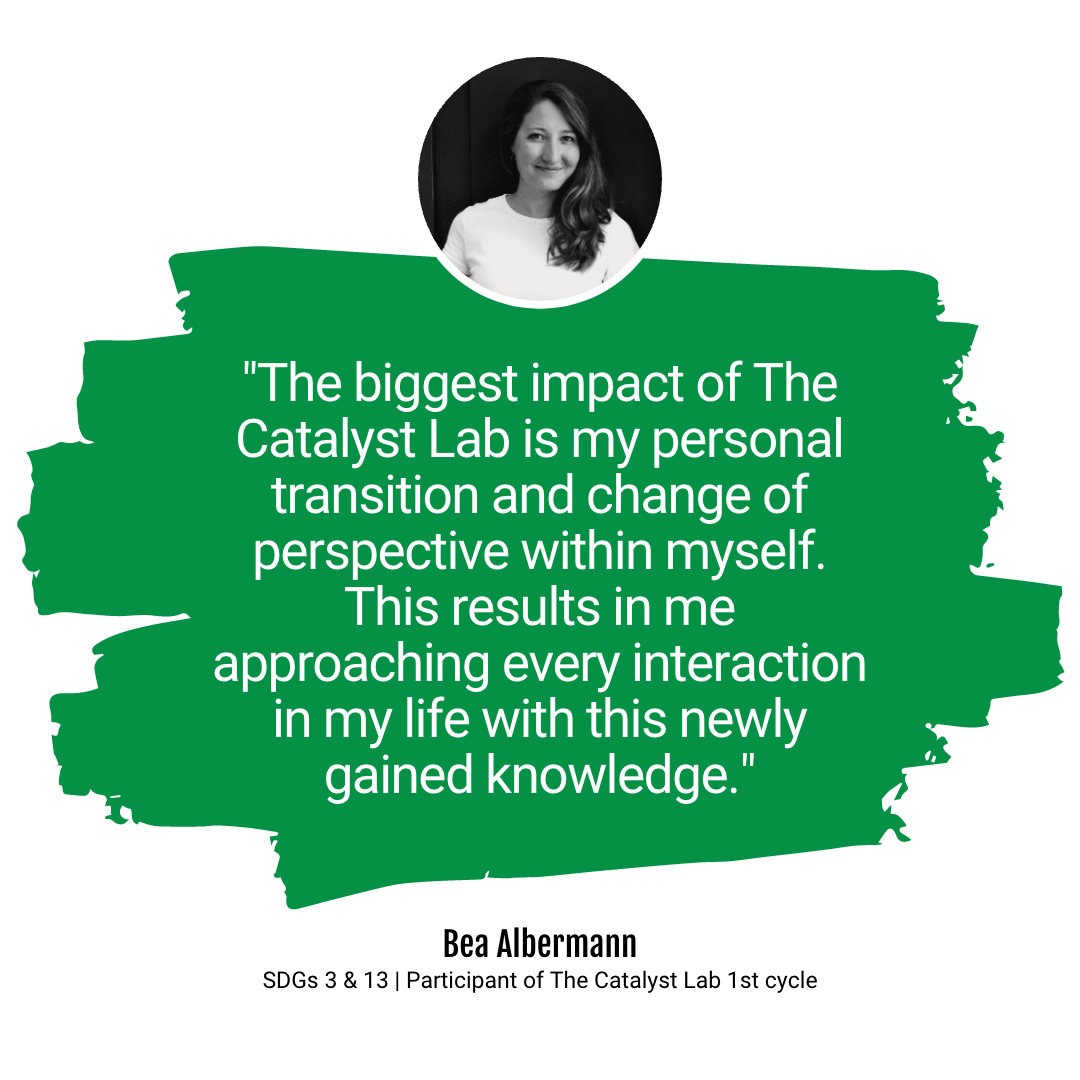Catalyst Lab first edition - Outcomes
“The future can’t be predicted, but it can be envisioned and brought lovingly into being. Systems can’t be controlled, but they can be designed and redesigned. We can’t surge forward with certainty into a world of no surprises, but we can expect surprises and learn from them and even profit from them. We can’t impose our will upon a system. We can listen to what the system tells us, and discover how its properties and our values can work together to bring forth something much better than could ever be produced by our will alone.”
- Donella Meadows
Why the Catalyst Lab?
It is increasingly clear that the challenges that our society faces cannot be solved in the ways we have been accustomed to, through prediction and control. The climate crisis, the unsustainable ways the global economy works, inequality that leads to migration and social unrest - just to name a few - require a different attitude towards making sense of the present and preparing for the future. Meticulous planning for the future, that includes analysis, preparation and execution is unrealisable. As demonstrated by the overwhelming response to initiatives (such as the VersusVirus hackathon) to take on emerging issues during the COVID-19 crisis, there is no shortage of people who are ready to step up and dedicate themselves to working on specific challenges they see in their domain. What is missing is an accessible support and training program that offers alternatives to control-based problem-solving, while supporting those who are working on experimental initiatives for a better future. The Catalyst Lab is designed to bridge this gap, preparing participants to employ systems thinking, awareness-based change methodologies, and other processes, in order to help them launch transformative projects and catalyse collective action.
“I changed the narrative {of my project}, from negative to positive.
From working on the Climate Crisis to One Health”
- Bea Albermann
What is the Catalyst Lab?
The Catalyst Lab is a 7 months long experience-oriented training that consists of a series of sequential modules, multiple coaching sessions and webinars based on the core methods of collaboratio helvetica, designed to accompany participants on the journey to become systems-level change-makers. It is an invitation to those who hold an intense curiosity and deep calling to shape the future of Switzerland by implementing the Agenda 2030, and by contributing to the transformation towards more ecological responsibility, humanity and the common good.
The Catalyst Lab provides a unique collective learning environment that prepares participants to become catalysts in their regional and topical system while developing a keen awareness of ecosystems and emergent contexts, and the ability to navigate multi-dimensional complexity. The curriculum is based on classical as well as emerging thoughts, methods and processes, woven together with awareness-based practices, guiding participants to leave behind ingrained, rigid patterns of thinking, to develop a holistic, comprehensive view of systems and to find unique ways to catalyse systemic change in their own highly specific contexts.
The ultimate goal of the Catalyst Lab is to prepare participants to apply what they learn at the Lab in their own context, and activate systemic change processes in different segments and sectors in Switzerland - by launching their own Social Innovation Lab or another form of collective action based on awareness-based change methods, and by activating and connecting their own ecosystem with the change-maker community of collaboratio helvetica.
What Catalysts learned
Awareness-based change: from Ego to Eco
During the Catalyst Lab journey, participants become familiar with awareness-based change methods such as Theory U and Social Innovation Labs, and sharpen their understanding of themselves and their work as deeply embedded in the complex systems that constitute our world. They learn about systems theory and acquire skills and processes to navigate complexity. They are encouraged to develop personal practices to remain connected to themselves, to others, and to their environment. They build their capacity in methods such as Dialogue and Art of Hosting , in order to invite others to participate and support them to contribute to systemic change in their context. Participants are encouraged to actively collaborate with each other and consciously weave and grow their ecosystems, recognising the crucial importance of collective sensing, thinking and action.
Human capital, social capital, physical capital
In order to become part of the Catalyst Lab, applicants go through a selection process, to make sure that they are the right people, in the right place and at the right time to catalyse transformation of their own sector. Selected candidates not only have a proven record of working on social innovation projects, they have a strong dedication to grow and evolve themselves, and they are also deeply embedded in a community or group in a specific domain, where they can activate what they learn during the catalyst journey. After completing the Lab, participants are aware of the importance of and have the skills for consciously building, weaving and activating their own social networks, contributing to the growing ecosystem of changemakers in Switzerland and deepening crucial collaborative relationships across sectors. With a deeper understanding of systems and societal transformation, catalysts are supported to launch their own systems-level projects, often in collaboration with each other, which lead to new services and products, further extending the impact of the Catalyst Lab.
Catalysing systemic change
Often the drive to ‘change the world’ fosters a desire to impose our will on the system, to fight and control the complexities that are present. Based on Donella Meadows’ work in systems thinking, and loosely organised around the Theory U process, with intensive sessions on specific tools such as Social Innovation Labs, Dialogue, and other collective sensing processes that move towards a deeper understanding of systems and systemic change, the Catalyst Lab supports participants to let go of the desire to predict and control, and instead, learn how to listen to, respect and work with their system. The programme is built around developing and strengthening the capacity to use emerging situations, surprises and tensions to better understand the context and to use the full spectrum of human skills: rationality, the ability to see the difference between truth and falsehood, intuition, compassion, vision, and morality to live and work more consciously within complex systems.
[What I learned is that] “Emergence happens in my work, when I listen to what feels right to focus on in any given moment, trusting my knowledge and those around me. It happens when we start to play and don't take ourselves too seriously. When we see challenges as an opportunity to live our creativity and reinvent ourselves and relationships with others.”
- Chantal Calame
Ecosystem activation
With a strong focus on community building, caring for oneself and for others, and collective action, the Catalyst Lab itself is a model environment for catalysts to learn hands on the power of a small group coming together and working towards a shared vision. By the end of the journey, participants become members of a lively community and a network of committed people who offer each other methodological, content-related, moral and fundraising support and create synergies together. Throughout the process, they acquire the necessary skills and tools to lead their own team towards becoming such a close-knit support community, expanding thought horizons and boundaries of care. In a fractal-style progression, the catalysts become accelerators of change in their own context, contributing to the larger ecosystem that works towards more ecological responsibility, humanity and common good in Switzerland.
“I am much more interested now in creating something in collaboration and in combining approaches, competences, sectors etc. I think in the beginning of the lab I was still much more in the mindset of having to do everything on my own.”
- Anna Krebs
Transformation of the catalysts
The Catalyst Lab is a deeply personal journey that unlocks the participants’ potential to become catalysts of systemic change within their own context. As a dedicated experimental space for open, in-depth discussions, dialogues and multi-level sensing, the Lab also offers an opportunity to grow in confidence, question assumptions, to reexamine and change perspectives, and to develop a holistic way of thinking and acting by becoming aware of ‘the place I am acting from’ and connecting to their own source of creativity and inspiration.
“During the Catalyst Lab I learned more patience and perseverance with the type of work that I am doing. Acknowledging that working on systemic change takes time, building relationships of trust is key and takes time. If I hold on, unexpected synergies, opportunities, and solutions can emerge.”
- Anna Krebs
New prototypes and collaborations (a selection)
Simon: Gipfelstürmer Programm “GiP für Gemeinden” - SDG 11, 12, 16
The GiP Gipfelstürmer Program is a one year taylormade workshop-program launched in June 2020 and funded by Mercator, comprising 10 workshops which are based on the interests of the local community. Thus future sustainable solutions and behaviour patterns are brought to the population. This process is supported by the coaching application SUSLA. From the workshops, working groups are formed which, under methodical guidance, develop new solutions / prototypes for the community. Based on the new prototypes a common vision of a sustainable future will be formed. The movement that has been initiated will gradually transform the municipality over the year and support its readiness for the future.
Bea: One Health - SDG 3 and 13
“Our existing systems are harming the health of all life on this planet – we are facing a global health crisis and change is needed, now. We need to enable all human beings access to health, protect animal life, ensure biodiversity and work towards climate justice: It’s time to redefine our understanding of health and reconnect our own health to the health of our environment in order to move towards one health for all.”
News articles:
Main Audience
OHA: Public in general, health care professionals
SMP: students at Swiss universities, professors
Anna: Gender and Inclusion - SDG 5
The Gender Dialogue Spark project consisted of designing and facilitating creative and innovative gender equality workshops for organisations and companies that allows participants to explore aspects of gender on a personal, societal and organizational level. It results in learnings around the status quo of gender equality within the organisation and ignites a spark for change to reach the full potential of the organisation's diversity. Moreover, the project included publishing portrait interviews of Gender & Diversity experts, writing blog posts and hosting various events such as:
Expert Panel: Gender, Inclusion and the Future of Work, an online panel event for organisations, HR personnel and individuals interested in those teams and looking for ideas on how to move forward after the Covid-19 era in an inclusive way
Sense-making workshop online: How does quarantine influence gender equality and how we work together?
Deep Listening and Generative Dialogue Practices Online, a workshop for the International Gender Champions Network
Interviews:
Why we need to step outside of our own bubbles avec Fleur Heyworth, Geneva Center for Security Policy
Why men need to emancipate inwards avec Gilles Crettenant, Mencare
Stories alone won't change structures and behaviours avec Stefanie Hetjens, Transgender Network
Why we need to change the myth about part-time work being a killer of careers, Simona Scarpaleggia
Nils and Markus: Projekt Schulwandel, Anlaufplattform und Leuchtturmprojekt LernHaus Sole, um Schulen im Wandel zu begleiten - SDG 4 and 9
Das LernHaus Sole baut Lernen von Grund auf neu, mit dem Menschen im Zentrum. Die erarbeiteten Erkenntnisse und Formate werden auf Schulwandel.ch zur Verfügung gestellt. Dort können sich zudem jene Menschen eintragen, die sich ein Bildungssystem nach dem Vorbild des LernHaus Sole wünschen. Im CoLearning Bereich können sie miteinander in den Austausch kommen.
Daniel: Dialog in der Politik und in Gemeinden - Wie erreichen wir den Wandel in der Demokratie/Politik - SDG 4, 16
With the “Partizipative Bürgergespräche” (participative citizens dialogues) the aim is to create dialogue processes that enable a deeper connection and collaborative relationship between citizens and the political parties and organs, and to enhance the citizens participation in political decision making processes. First prototypes are in preparation with the cantons Bern, Solothurn und Geneva to be able to launch in January 2021. With the cantons Thurgau and Aargau conversation are being actively pursued. The canton Luzern has also announced interest. In September the workshop days will get designed and a team of facilitators assembled. The PR and Media work will begin in September.
All of this is being developed and expanded in combination with the future dialogues that are being launched in the autumn 2020.

